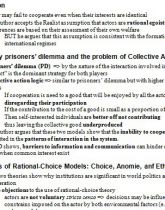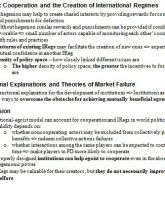Studijní materiál: Rational-choice and functional explanations
Skrýt detaily | Oblíbený- Kvalita:84,4 %
- Typ:Studijní materiál
- Univerzita:Univerzita Karlova v Praze
- Fakulta:Fakulta sociálních věd
- Kategorie:Humanitní vědy
- Podkategorie:Politologie
- Předmět:Mezinárodní vztahy
- Autor:clean.bandit
- Ročník:3. ročník
- Rozsah A4:2 strán
- Zobrazeno:1 394 x
- Stažené:0 x
- Velikost:0,1 MB
- Formát a přípona:MS Office Word (.doc)
- Jazyk:anglický
- ID projektu:9386
- Poslední úprava:09.01.2017
Introduction
• Actor may fail to cooperate even when their interests are identical
• The author accepts the Realist assumption that actors are rational egoists => their preferences are based on their assessment of their own welfare
o BUT he argues that this assumption is consistent with the formation of international regimes
Single-Play prisoners’ dilemma and the problem of Collective Action
• Prisoners’ dilemma (PD) => by the nature of the interaction involved in the game, to “defect” is the dominant strategy for both players
• Collective action logic => similar to prisoners’ dilemma but with higher number of actors
• If cooperation is need to a good that will be enjoyed by all the actors disregarding their participation
• If the contribution to the cost of a good is small as a proportion of its total cost
• Then self-interested individuals are better off not contributing
• thus leaving the collective good underproduced
• The author argues that these two models show that the inability to cooperate is inherited in the patterns of interaction in the system.
• As PD shows, barriers to information and communication can hinder cooperation even when common interest exist
• Actor may fail to cooperate even when their interests are identical
• The author accepts the Realist assumption that actors are rational egoists => their preferences are based on their assessment of their own welfare
o BUT he argues that this assumption is consistent with the formation of international regimes
Single-Play prisoners’ dilemma and the problem of Collective Action
• Prisoners’ dilemma (PD) => by the nature of the interaction involved in the game, to “defect” is the dominant strategy for both players
• Collective action logic => similar to prisoners’ dilemma but with higher number of actors
• If cooperation is need to a good that will be enjoyed by all the actors disregarding their participation
• If the contribution to the cost of a good is small as a proportion of its total cost
• Then self-interested individuals are better off not contributing
• thus leaving the collective good underproduced
• The author argues that these two models show that the inability to cooperate is inherited in the patterns of interaction in the system.
• As PD shows, barriers to information and communication can hinder cooperation even when common interest exist


